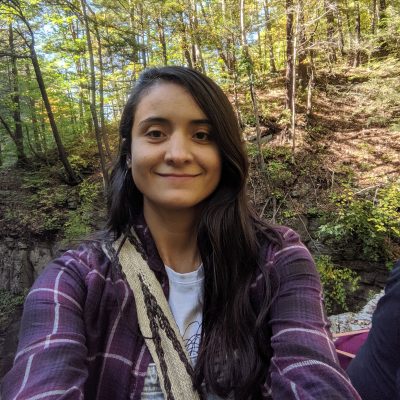Student Spotlight: Diana Obregon Corredor

April 13, 2020
Diana Obregon Corredor is a doctoral student in entomology from Bogota, Colombia. After earning her undergraduate degree at the National University of Colombia, she chose to pursue further study at Cornell due to its research opportunities, her advisor, and the reputation of the entomology program.
What is your area of research and why is it important?
My research looks at the impact of the loss of natural habitat and pesticide use on bee communities in tropical agricultural settings. For instance, I am describing how the reduction of the forest around field crops and the application of insecticides, mainly neonicotinoids, are decreasing the diversity and abundance of bees pollinating flowers in an endemic fruit crop in Colombia. I am also exploring how insecticides used in livestock farms to treat the cattle are potentially being consumed by bees when residues of the pesticides reach wildflowers in the prairies through contamination with animal feces.
What are the larger implications of this research?
About 75% of the crops globally cultivated depend on insects to get their flowers pollinated and produce relevant yield. Bees are the main taxa providing this fundamental service. By improving the understanding of the factors that are decreasing bee populations, we can design strategies and promote policies to protect them.
What inspired you to choose this field of study?
I have been always super inspired by nature and in particular by insects because these amazing creatures have all kind of bizarre behaviors, but also tremendous impacts in our daily life both as pests and as providers of different ecosystem services.
Where did you study with your Graduate School Research Travel Grant?
I went to the eastern region of the Colombian Andes to conduct experiments in livestock and fruit-producing farms. I also visited to the National University of Colombia UNAL to identify the bees that I collected in the field and to the Industrial University of Santander UIS to developed chromatographic analysis to detect pesticides in pollen and nectar samples.
How important was obtaining a Research Travel Grant for your research?
This grant was fundamental to obtain core information for my dissertation and also to establish different collaborations with academic institutions in Colombia.
What did this grant allow you to do that you might not have otherwise been able to?
Thanks to this grant, I was able to collect information in remote areas where there is a huge biodiversity but not many research initiatives. The majority of evidence for the argument that bees are declining is based on studies from temperate regions. So, having the opportunity to study the tropics helps me to contribute to fill the gaps of information in the field.
What are your hobbies or interests outside of your research or scholarship?
I love outdoor activities like visiting natural parks or enjoying sunny days near a river or a lake. I also like dancing and hanging out with my friends. I recently started painting with watercolors.
Why did you choose Cornell to pursue your degree?
I chose Cornell because from our previous conversations, I knew my advisor, Dr. Katja Poveda, would be a great mentor, and my research ideas would fit with her lab and her interests on tropical agroecosystems. Besides, the field of entomology has an impressive reputation, and some of the most renowned entomologists in the world are Cornell alumni. And of course, Ithaca is a great town to live in with a very welcoming and progressive community.
